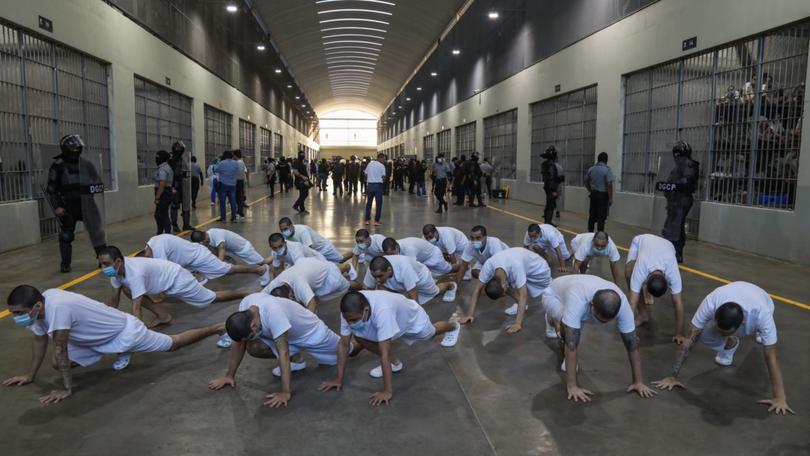Supreme Court briefly pauses order to return US deportee from El Salvador mega jail
The fate of a US man mistakenly deported to a mega-prison in El Salvador remained in limbo after the Supreme Court briefly paused an order requiring the Trump administration to bring him home.

The fate of a US man mistakenly deported to a mega-prison in El Salvador remained in limbo Monday, local time, after the Supreme Court briefly paused an order requiring the Trump administration to bring him home.
Kilmar Abrego Garcia, 29, who was living in the eastern state of Maryland, was among more than 200 people sent to a notorious prison in El Salvador last month as part of President Donald Trump’s crackdown on undocumented migrants.
US District Judge Paula Xinis ordered Friday that Abrego Garcia be returned to the United States by 11:59 pm on Monday, local time, after Justice Department lawyers admitted he was deported due to an “administrative error.”
Sign up to The Nightly's newsletters.
Get the first look at the digital newspaper, curated daily stories and breaking headlines delivered to your inbox.
By continuing you agree to our Terms and Privacy Policy.The Salvadoran immigrant, who is married to a US citizen, was deported despite a court ruling forbidding it.
Supreme Court Chief Justice John G.Roberts Jr gave Abrego García’s attorneys until Tuesday 5pm, local time, to respond to the Government’s request to allow his deportation to stand while litigation over the matter continues.

The truncated timeline indicates the conservative-dominated Supreme Court is likely to act quickly in the case. Mr Abrego García’s lawyers submitted their filings shortly after the administrative stay was announced. One of them, Simon Sandoval-Moshenberg, said in a statement that “we have every confidence” the high court will resolve the case “as quickly as humanly possible.”
Their filing said Abrego García “sits in a foreign prison solely at the behest of the United States, as the product of a Kafkaesque mistake.”
Mr Abrego García’s situation has become a focal point of the Trump administration’s attempt to deport millions of non-citizens from the United States - and the court battles over the legality of that campaign.
The 29-year-old sheet metal apprentice fled El Salvador as a teenager because of death threats from gang members. Trump officials have argued that they have no power to return him because he is now in the custody of a foreign government.
District Court Judge Paula Xinis forcefully pushed back on that assertion Sunday, writing that the Federal Government does have the authority to return Mr Abrego García and that while Trump officials have also alleged he is a leader of the MS-13 gang, they have offered “no evidence” to prove that.
Officials made the allegation based on a report from a confidential informant, but that information did not result in Abrego García being charged with a crime or otherwise implicated. “Nothing came of it,” the judge wrote.
Judge Harvie Wilkinson, an appointee of former Republican president Ronald Reagan,wrote: “There is no question that the government screwed up here.
“The facts of this case thus present the potential for a disturbing loophole: namely that the government could whisk individuals to foreign prisons in violation of court orders and then contend... it is no longer their custodian, and there is nothing that can be done,” he said.
“It takes no small amount of imagination to understand that this is a path of perfect lawlessness, one that courts cannot condone,” Wilkinson said.
Ms Xinis noted that the Trump administration is paying the Salvadoran government $6 million to detain Abrego García and other deportees. An agreement between the two countries states that U.S. officials will decide what happens to the detainees in the future.
She also noted that Homeland Security Secretary Kristi L Noem recently visited the Salvadoran prison and met with President Nayib Bukele and other officials, saying the jail remained a tool for U.S. immigration enforcement.
The U.S. Court of Appeals for the 4th Circuit declined on Monday to overrule Xinis’s decision. The three-judge panel unanimously agreed that the order to bring Abrego García back “should not be stayed.”
“The United States Government has no legal authority to snatch a person who is lawfully present in the United States off the street and remove him from the country without due process,” said the decision, written by Judge Stephanie Thacker. “The Government’s contention otherwise, and its argument that the federal courts are powerless to intervene, are unconscionable.”
Deporting Abrego García “most assuredly” violated his Fifth Amendment right to due process, Thacker wrote. She pointed out that the U.S. government has readmitted wrongfully deported migrants before.
“Now it must clean up the mess it has made” in Abrego García’s case, the order said.
Thacker was nominated to the federal appeals court by President Barack Obama. Wilkinson was nominated by President Ronald Reagan. The third judge on the panel, Robert Bruce King, was appointed by President Bill Clinton.
The Trump administration did not wait for the appeals court ruling before filing its emergency appeal at the Supreme Court. Solicitor General D. John Sauer argued that the midnight deadline was pressing and said Xinis was impinging on the authority of the president.
“Even amidst a deluge of unlawful injunctions, this order is remarkable,” Sauer told the justices. “Even respondents did not ask the district court to force the United States to persuade El Salvador to release Abrego García - a native of El Salvador detained in El Salvador - on a judicially mandated clock. For good reason: the Constitution charges the President, not federal district courts, with the conduct of foreign diplomacy and protecting the Nation against foreign terrorists, including by effectuating their removal.”
The Trump administration has been adamant in statements outside of court that it will not return Abrego García. Deputy Attorney General Todd Blanche placed a senior Justice Department on indefinite leave after he admitted in court that Abrego García was removed from the United States in error.
Erez Reuveni, the acting deputy director of the Office of Immigration Litigation, also told Xinis he did not know what authority officials used to deport Abrego García. The administration had previously said in court filings that Abrego García’s removal was an “oversight” and an “administrative error.”
“My answer to a lot of these questions is going to be frustrating,” Reuveni told Xinis. “And I’m frustrated that I don’t have answers to a lot of these questions.”
Attorney General Pam Bondi said in a statement that “every Department of Justice attorney is required to zealously advocate on behalf of the United States” and added that “any attorney who fails to abide by this direction will face consequences.”
Abrego García was deported to El Salvador on March 15, days after he had been stopped by ICE officers in Maryland while driving from his mother’s house to his home in Prince George’s County, Maryland. His 5-year-old autistic son, who is unable to speak, was in the back seat. Abrego García was detained and sent to Texas before federal authorities deported him.
Abrego García is the son of a former police officer in El Salvador. He came to the United States around 2011, as a teenager, because a violent gang was trying to recruit him and extort money from his mother, who owned a family-run pupusa stand, according to court records. The man’s attorneys have said he has no criminal history in El Salvador or the United States and is not a gang member, despite allegations from law enforcement and ICE officials that date back to 2019.
In March of that year, Abrego García and other day laborers seeking construction jobs at a Home Depot were detained by police and questioned about gang activity. Abrego García said he wasn’t in a gang.
“Our entire family is broken,” Abrego García’s wife, Jennifer, said at a rally Friday in Maryland.
The Trump administration has filed multiple emergency appeals to the Supreme Court in recent weeks, seeking to overturn rulings by lower court judges that the government says have inappropriately put temporary holds on a number of the president’s initiatives while litigation continues.
The justices ruled on one motion Friday, allowing the administration to freeze up to $65 million worth of grants for teacher shortages that the administration said promote diversity, equity and inclusion initiatives.
The court could rule in the coming weeks on temporary holds that have blocked officials from using a wartime authority to deport alleged members of a Venezuelan gang, firing thousands of probationary workers and ending birthright citizenship.
A divided high court last month allowed to stand a lower-court order requiring the administration to restart $2 billion in foreign aid it had frozen.
